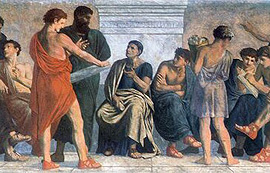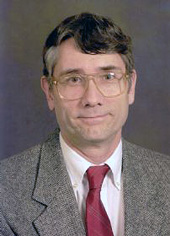The Return of Aristoxenus
September 9, 2009
More than 2,300 years after his death, the life's work of Aristoxenus of Tarentum is alive at DePauw. The Greek biographer and music theorist is the topic of the 16th meeting of Project Theophrastus, being held Sept. 10-12 in the Memorial Student Union Building, Room 240.
 Aristoxenus (air-es-TAWK-seh-nus), a student of Aristotle's Peripatetic school, is best known as one of the classical world's first music theorists. In the 4th century BCE, philosophers such as the Pythagoreans often described music in mathematical terms of scales and ratios. Aristoxenus argued otherwise; he felt that music could only be judged by the ear—and not just any ear. He prescribed a training regimen for music critics so that they would be able to separate "good" music from "bad." (Unsurprisingly, he wasn't a fan of the period's contemporary musicians.) Although music theory was Aristoxenus' niche in philosophy—he was known in antiquity as the Musician—only one of his writings on the subject, Elements of Harmony, remains in full.
Aristoxenus (air-es-TAWK-seh-nus), a student of Aristotle's Peripatetic school, is best known as one of the classical world's first music theorists. In the 4th century BCE, philosophers such as the Pythagoreans often described music in mathematical terms of scales and ratios. Aristoxenus argued otherwise; he felt that music could only be judged by the ear—and not just any ear. He prescribed a training regimen for music critics so that they would be able to separate "good" music from "bad." (Unsurprisingly, he wasn't a fan of the period's contemporary musicians.) Although music theory was Aristoxenus' niche in philosophy—he was known in antiquity as the Musician—only one of his writings on the subject, Elements of Harmony, remains in full.
Following Aristotle's death, Aristoxenus petitioned to become the school's new leader, but was passed up for Theophrastus, another pupil. Aristoxenus felt spurned by the decision, a reaction that colors modern interpretation of his other pursuit: biographies. He is one of the earliest biographers in the Western tradition, having written about the lives of Plato, Pythagoras and Socrates. Passages in these works have been described as libelous rantings of a disappointed runner-up.
"In modern scholarship," explains Professor of Classical Studies Carl A. Huffman, "the standard view is that Aristoxenus was a horrible muckraker who told nasty stories about Socrates and Plato to tarnish their reputations." His alternative interpretation of Aristoxenus, a topic on which Huffman is presenting, is the reason why this year's conference is being held at DePauw. Hufffman returned this semester from an American Council of Learned Societies Fellowship to study the philosopher at the School of Historical Studies at the Institute for Advanced Study in Princeton, N.J.
Hufffman returned this semester from an American Council of Learned Societies Fellowship to study the philosopher at the School of Historical Studies at the Institute for Advanced Study in Princeton, N.J.
"I happen to think Aristoxenus' biographies can tell us interesting, useful things," Huffman (right) says. "He has comments about Socrates' temper and his sex drive, and alleges that Plato's Republic was plagiarized from another philosopher's work. The question is, is he trying to slander them, or is he trying to provide an accurate account of their lives?"
William Fortenbaugh of Rutgers University founded Project Theophrastus in the 1970s to collect information and comment on Aristotle's successor. Since then, the Project's scholarship has branched out to include other Peripatetic philosophers, such as Aristoxenus. Its members meet biennially in locations around the world—Rome in 2007 and Trier, Germany, in 2011—to combine their research into volumes for use by future historians.
Huffman hopes that DePauw students from all academic disciplines find time to visit at least one of the conference sessions. Of the 11 visiting scholars, eight are from outside of the United States, but those who are able have been asked to present in English for the sake of accessibility.
"I think the conference will give students an idea about what their professors do when they aren't in class," he says. "They will be able see the result of years of research and judge whether or not they want to take their studies further as a graduate student. When it comes to scholarship, this is the real thing."
Attendance to Aristoxenus: Music, Biography, and Philosophy in the Early Peripatetic School is open to all. Visit the conference's Web site for more information and a full schedule of presentations.
